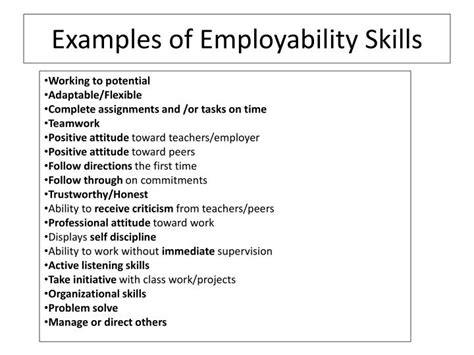Understanding Employability Skills: Definition And Examples

Do you want to succeed in your career? Then you need to have employability skills, which are the skills and qualities that employers look for in their employees. In this post, we’ll define employability skills and provide examples of how to develop them.
The Definition of Employability Skills
Employability skills are the transferable skills and personal attributes that make an individual employable. These skills are not specific to any particular job, industry, or sector. Instead, they are universal skills that are essential for success in any workplace. Employers look for candidates who possess these skills because they know that these skills will enable them to perform well in their role and contribute to the success of the organization.
The Importance of Employability Skills
Why Are Employability Skills Important?
Employability skills are important because they enable individuals to perform well in their role, adapt to changing circumstances, and contribute to the success of the organization. Employers value these skills because they know that employees who possess these skills will be more productive, efficient, and effective.
Benefits of Possessing Employability Skills
- Increased job opportunities
- Greater job security
- Higher earning potential
- Greater job satisfaction
- Enhanced career progression
Examples of Employability Skills
Transferable Skills
Transferable skills are skills that can be applied to a wide variety of jobs and industries. Examples of transferable skills include:
- Communication skills
- Teamwork skills
- Problem-solving skills
- Critical thinking skills
- Leadership skills
- Time management skills
- Organizational skills
- Interpersonal skills
- Adaptability skills
- Initiative skills
Personal Attributes
Personal attributes are the qualities that make an individual unique. Examples of personal attributes include:
- Positive attitude
- Reliability
- Flexibility
- Resilience
- Integrity
- Self-motivation
- Confidence
- Emotional intelligence
- Creativity
- Open-mindedness
How to Develop Employability Skills
1. Identify Your Strengths and Weaknesses
Take an inventory of your skills and identify your strengths and weaknesses. Focus on developing your weaknesses while continuing to build on your strengths.
2. Seek Feedback
Ask your colleagues, supervisors, and mentors for feedback on your performance and areas for improvement. Use their feedback to develop your skills.
3. Take Advantage of Training and Development Opportunities
Attend training sessions, conferences, and workshops to develop your skills and knowledge. Take advantage of any development opportunities offered by your employer.
4. Volunteer for Projects
Volunteer for projects outside of your job description to gain new skills and experiences.
5. Practice Your Skills
Practice your skills in real-life situations to improve your performance and build your confidence.
FAQs
What Are Examples of Employability Skills?
Examples of employability skills include communication skills, teamwork skills, problem-solving skills, critical thinking skills, leadership skills, time management skills, and organizational skills.
Why Are Employability Skills Important?
Employability skills are important because they enable individuals to perform well in their role, adapt to changing circumstances, and contribute to the success of the organization. Employers value these skills because they know that employees who possess these skills will be more productive, efficient, and effective.
How Can I Develop Employability Skills?
You can develop employability skills by identifying your strengths and weaknesses, seeking feedback, taking advantage of training and development opportunities, volunteering for projects, and practicing your skills in real-life situations.
